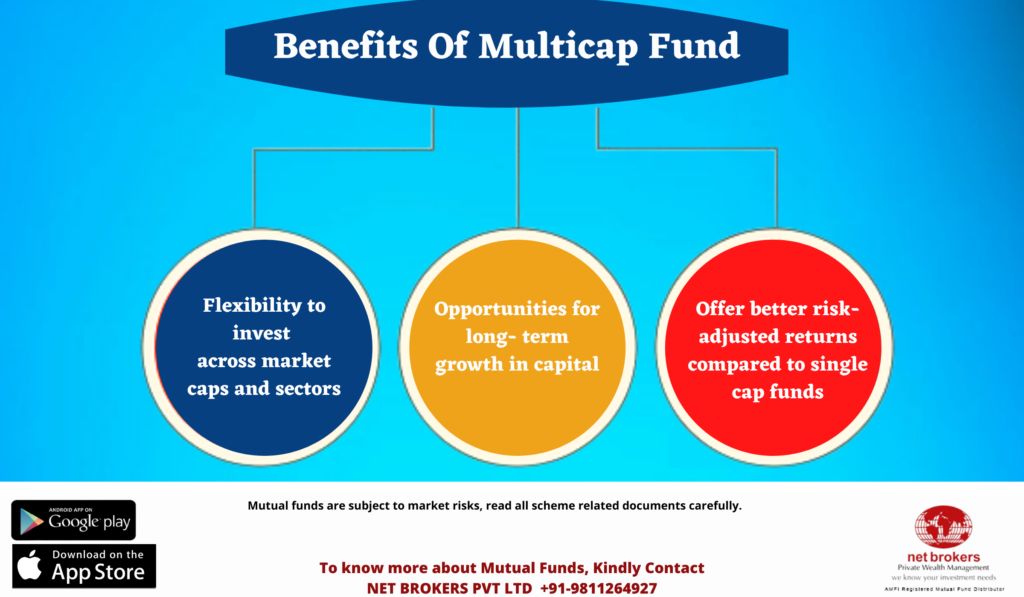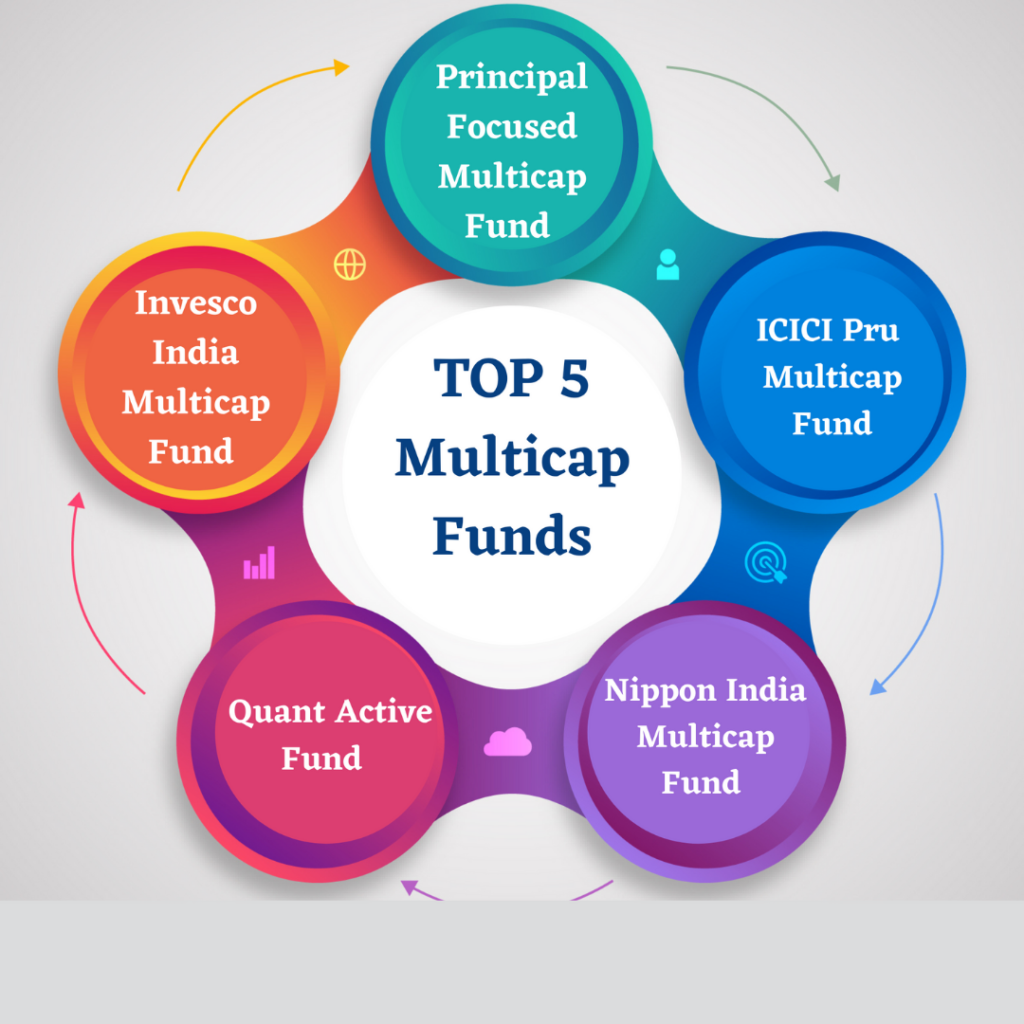Understanding Multicap Funds
By Akhil Chugh
Date November 21st, 2021
If you ever ask experienced investors about the most important rule of investing to ensure optimum returns at reasonable risk, their answer will never be putting all the eggs in one basket – i.e., having a diversified portfolio of securities.
The reason behind this is that a diversified investment will help in reducing the risk factor.
Multicap mutual funds make the work easy for you. As an investor, you won’t have to go around buying shares of different firms; instead, enjoy the advantage of a diversified portfolio by simply investing in a Multicap mutual fund.
Let’s understand more about Multicap Funds in this blog.
What are Multicap Funds?
Multicap funds invest in diversified stocks of large-cap, mid-cap and small-cap across sectors. These funds capitalise on the opportunities across market caps and generate optimal returns for investors.
Last year, the markets regulator, SEBI changed the guidelines of investments in which Multicap funds have to invest minimum 25% each in large-cap, mid-cap and small-cap stocks.
This was done to ensure Multicap schemes hold a diversified portfolio across large-cap, mid-cap, and small-cap companies and make the funds more diversified.
The Securities and Exchange Board of India (Sebi) had also introduced a new category called Flexicap mutual funds which has the flexibility in allocation across market caps and there is no restricted limit. This helped fund managers to avoid reshuffling the multicap portfolio and many existing Multicap funds switched to Flexicap category.

Before learning more about Multicap funds, let’s understand the difference between Multicap and Flexicap funds below.
Multicap Vs Flexicap: At a glance

Why Invest in Multicap Funds?
Owing to its multi cap nature, Multicap funds provide several benefits to investor and should be a part of every investor’s portfolio. Let’s look at some of them,

1. Diversification:
Since Multicap funds invest across companies of various sizes and sectors, they offer a diversified portfolio. This diversified approach lowers down the risk for you. That’s because different sectors or parts of the market can perform differently at any given time, and this spreading out of investments across keeps the risk in control.
Large caps can provide stability to the portfolio, while mid and small caps can provide a boost to the capital.
2. Long-term wealth creation:
Multicap funds have the flexibility to invest in companies across the sectors that are poised to benefit from the economic activity. Thus, as an investor, you don’t miss out on any opportunity available in the Indian market. Therefore, in the long run, Multicap funds are usually better wealth creators than other categories of pure funds like Largecap funds or Midcap funds as they can take advantage of investment opportunities across the market.
3. Better risk-adjusted returns:
As fund managers can invest across all market caps – largecap, midcap and smallcap, and can alter allocation based on the direction of the market in line with SEBI mandate, Multicap mutual funds can regulate risk by reducing allocation to riskier segments of the market, and minimise its impact by increasing allocation to companies that are poised to deliver in the long run.
Who Can Invest in Multicap Funds?

Investors who do not have sufficient time to independently research specific investments in the market can invest in Multicap schemes. These are mainly helpful for long-term wealth creation.
Which are Best Multicap Funds to Invest?
Based on our analysis and research at Net Brokers, below mentioned schemes are currently the best schemes in the Multicap fund category. These funds fare well on quantitative and qualitative parameters and have the potential to deliver optimal growth in the long run.


How are Multicap Funds Taxed:
Tax on Multicap mutual funds depends on how long the investment is held by an investor and is taxed as follows:
Short Term Capital Gain Tax (STCG):
If you sell your investments within 1 year, the gains are classified as Short-Term Capital Gain (STCG) and you need to pay 15% tax on them.
Long Term Capital Gain Tax (LTCG):
Whereas, any Multicap investment held for more than one year, the gains are classified as taxed Term Capital Gain (LTCG). Gains of up to 1 lakh in a financial year are tax-free. Beyond 1 lakh, the gains are taxed at a rate of 10%.
Key Takeaways for Investors:
- Multicap funds provide investors a better risk-return trade off – protecting from downside while delivering upside. These funds are suitable for investors with an investment horizon of at least 5 years.
- These schemes offer a diversified approach to investing in the equity markets and endeavour to make the best of every investment opportunity.
- Multicap funds are ideal for first-time equity investors as it keeps the risk in control. Also, since these investors might not be aware of the risks that come with investing in companies of a specific size, a Multicap fund is the best bet for them.
- Investing in Multicap funds can save investor’s time and efforts of switching exposure across different equity fund categories during changing market scenarios. An investor can enjoy the expertise of a fund manager of a Multicap fund who can make investment decisions based on market conditions while ensuring maximum returns for investors.
- Decision on investing in a Multicap fund should be based on the investor’s risk profile, financial goals and investment horizon.
Net Brokers believes, if you are looking for pure diversification across market caps and are willing to take on the risk level of the mid and small caps then Multicap funds are the right choice for you.
Having a long-term investment horizon is the ultimate key to success for investments in Multicap schemes.
For more information, get in touch with us today!
Download our mutual fund app & start investing for your long-term financial goals.
Happy investing!



